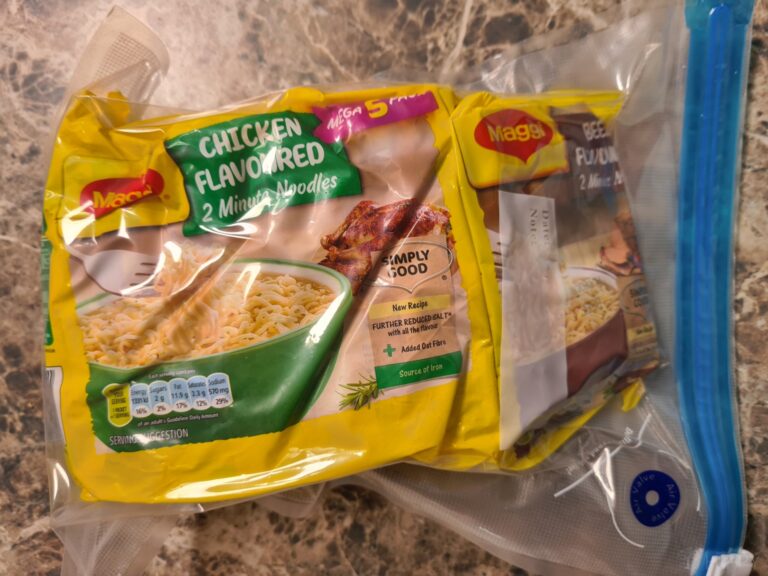Ramen noodles, also called instant noodles, are a popular food source for everyone including sportsmen and women, teenagers, preppers, college students, outdoorsmen, and homesteaders looking for a food with a very long shelf life.

Do Ramen noodles expire?
The simple answer is yes, they do expire and may go bad. They will typically last 8 – 12 months on the shelf, and then another 6 – 8 months past the expiration date. However, if you store them properly, expect them to last at least 1 year, and, according to some, for up to a decade.
A Popular Meal Choice
If you’re hungry but don’t have time to cook a large meal, then a pack of fresh ramen noodles is your new best friend.
You can have a bowl of ramen whenever and wherever you like; they take up very little space in your bag or pantry. Chicken noodle soup and noodles with baked beans are a popular meal choice for hikers because they’re lightweight and packed with nutrients.
You can also add a bit of rice to the meal for good measure if you’d like…
Store Ramen Noodles Properly
Provided you pack your ramen noodles the right way, These noodles will last anywhere between 8 and 12 months on the shelf. To get closer to a year, you’ll want to keep a cool, steady temperature in your pantry.
The dehydration process of preparation and storage is what gives these noodles a shelf life of up to a year.
However, if they are stored properly in airtight containers at room temperature, in a dark and dry pantry, they will still be edible for at least 3 to 4 months past the best-before date.
If you immediately stored them in a vacuum-packed bag in the deep freezer, they could last up to a year past the best-before date.
The taste of the flavor packet does break down over time which could result in foul-tasting noodles. The noodles are still edible but use an alternate flavor source.
Shelf Life vs. Fit for Consumption
As I said, the shelf life of Ramen noodles is 8 to 12 months. However, the shelf life for these noodles is based more on flavor than on danger.
The noodles themselves will not give you bad food poisoning or anything worse than an upset stomach if you consume them after their best-before date…
It’s not recommended to eat them if they are more than 8 months past their best-before date.
The flavor packet is what will make them either tasty or unpleasant to eat. Or, as some people experienced themselves, they “may taste like cardboard”.
Ramen noodles are made of wheat flour, salt, water, mineral water, and preservatives which once combined and mixed, are then dehydrated.
Dehydrating food removes the microorganisms that cause food to spoil and spread foodborne illnesses. Vitamin E is added as an antioxidant to slow down the oxidization process.
The oil used in the production of the noodles is what breaks down over time, causing them to lose their taste and break.
Keep Your Noodles Fresher for Longer
By ensuring the noodles are stored properly to protect them from air, moisture, and bugs, they will retain their taste even longer.
First and foremost, before you buy Ramen noodles, check that the packet is properly sealed. If the packet has a tear in it or is not properly sealed, do not buy it.
When you get home from the store, check each packet to make sure none popped open in your shopping bag. If any did develop tears, use these packets first.
For me, sealing the packets again in a vacuum bag prolongs the shelf life by protecting the noodles from bugs, moisture, and air – the air exposure over a prolonged period is what will accelerate the oxidization process causing your noodles to lose their flavor.
If you cannot vacuum seal the packs, store them in air and water-tight containers (i.e. freezer bags). Do not remove them from their original packaging.
The little packet of flavoring included with the noodles should also be sealed to retain its taste.
Store the noodles at room temperature in a dark, cool room (pantry) or cabinet away from other food sources that have a strong odor, as the noodles could absorb these odors, and it will affect the taste. Vacuum packaging is also brilliant for this.
Rotate your supply so that you always use the oldest noodles first.
How to Make Older Noodles Taste Delicious
While the noodles last a long time, the soup package included can lose its flavor. If you have older noodles, you can still use them by using other sources for the flavor to replace the included soup package.
If you feel the flavors are not tasty enough because they’re past the best-before date, you can lift the taste by adding grated cheese, by mixing in sliced jerky, or mixing canned vegetables or meat in with the noodles, adding minced beef (hamburger meat), or adding some stock to the cooked noodles.
Checking If Noodles Are Good to Eat
Obviously, we all prefer freshness over tastelessness. While Ramen noodles are not high in nutritional value, they are a good emergency food, as they are packed with carbohydrates for energy.
If you have noodles that are more than three months past their best-before date you should check the noodles carefully for mold, and smell them to see if they smell bad.
Also look at the color of the noodles to see if there is a change in color, and take a small bite when you eat to check that the taste is right.
Best-by vs. Expiration Date: What’s the Difference?
Best-by and expiration dates are meant to inform you when a product is past its best quality. A best-by date is typically found on shelf-stable foodstuffs like ramen noodles.
Expiration dates are most often found on foods that are prone to foodborne illnesses. They’re meant as a heads-up that your meats, and/or dairy products are about to spoil.
These are just a warning; they’re not meant as fixed dates for when you should throw the foods away.
Does the Seasoning Go Bad?
Simply put, yes, the seasoning will go bad after a while. Testing to see if it’s gone bad is as simple as sticking your finger in the spice and tasting it. If it tastes bad (i.e. sour, rancid, etc.) then it’s gone bad and you shouldn’t use/eat it.
If you have any doubts, do not eat them.
The further you get from the expiry or “best by” date, the worse the noodles will smell and taste. If they are years past the expiry date, they may give you an upset stomach or, even lead to vomiting.
While it is safe to eat Ramen noodles for a period after the expiration date, it is not recommended.
Before you consume expired noodles, check that:
- ☑️ There is no mold on or in the packet
- ☑️ The noodles do not smell bad
- ☑️ They haven’t lost their coloring
- ☑️ The expiration date is not exceeded by 3 months (this is more for the flavor; in a survival situation you may still eat them up to 2 years after they expire, but you will have to use an alternate source for flavor – the 2-3 years shelf life is not guaranteed, though)
- ☑️ Test the taste and texture of the first bite to make sure it tastes and feels right before you dig in
If you consume expired Ramen noodles 6 months after the expiration date, you will probably find the taste of the flavoring is not quite so good.
You Can Count On These Noodles
If you want to add an emergency food supply to your pantry, noodles are a good place to start.
Just keep in mind these noodles (or any instant noodles for that matter) aren’t necessarily the best food to eat on a daily basis.
Nutritionists don’t recomment them because of their high sodium content, as well as their saturated fats, not to mention they are fried before they are packaged and shipped. Oh, and don’t forget all the additives and preservatives that they have.
Still,they make a fine choice for your winter or survival stockpile, so don’t discount them. There is a room for ramen noodles in a varied pantry and diet.
Typically, dehydrated food could last years if it is properly protected from air and moisture. If you store the pasta properly but it has past the best-before date, I suggest using an alternate flavor source.
To sum up, by protecting your noodles from air and moisture you can make your Ramen noodles last well after their expiration date.

Di-Anne Devenish Seebregts was raised in an environment where daily life consisted of hiking, environmental conservation, growing fruit and vegetables, and raising poultry for meat and eggs.
She combined her passion for the writing word with her love of the pride that comes with not relying on others. She raised three children (who are now adults) to value the environment, and understand the value of being self-sufficient.
Find out more about Di-Anne on our About Us page.

Where is the expiration date located? I have a brand called Maruchan, Ramen Chicken flavor noodle soup in bags period . IT comes in Pack of 12.
Well I ate an Indonesian Ramen with an expiration date of 2012. Well it’s 2022 when i discovered a whole box. I opened one package which did not smell that bad at all. I boiled for one minute and rinse it 3 times with cold water. Then I added boiled chicken and added the usual Indonesian flavoring. I was surprised it tasted delicious. I did not experienced any gastrointestinal upset at all.anyway this is 10 years old. What happens if we have an atomic warfare and that’s the only good you have in your basement??? Please give any comments.
I have noodles that are in a 20 year storage plan. If there is nothing they will taste like steak lol never ate any over 2 years but will if I have 2. Glad to hear you ate soen 10 years old and didn’t have a problem thanks for posting
I’ve eaten Ramen noodles that I found at deer camp in a large Danish cookie tin to keep mice out. We cooked them, added a few wild vegetables that we foraged. Everything was fine, tasted great. Noodles were almost to the 9 year mark.
I also have 10+ year old Ramen noodles. Every 6 months or so I take a package out and cook it and they taste fine, never got sick no bad smells or mold or anything like that. The flavor packet gets hard after a few years so you need to crush it up so it dissolves in the boiling water, but I have never gotten sick from eating these noodles. If the SHTF I’m glad I have these noodles in my pantry to supplement my daily caloric intake.